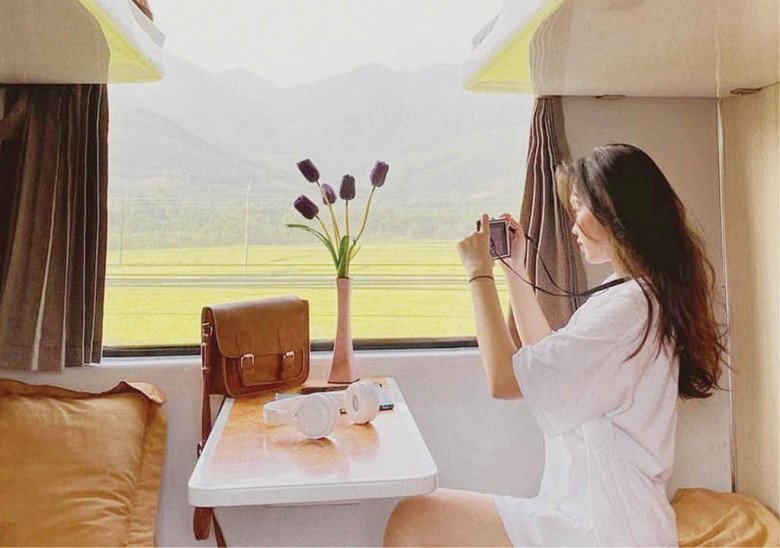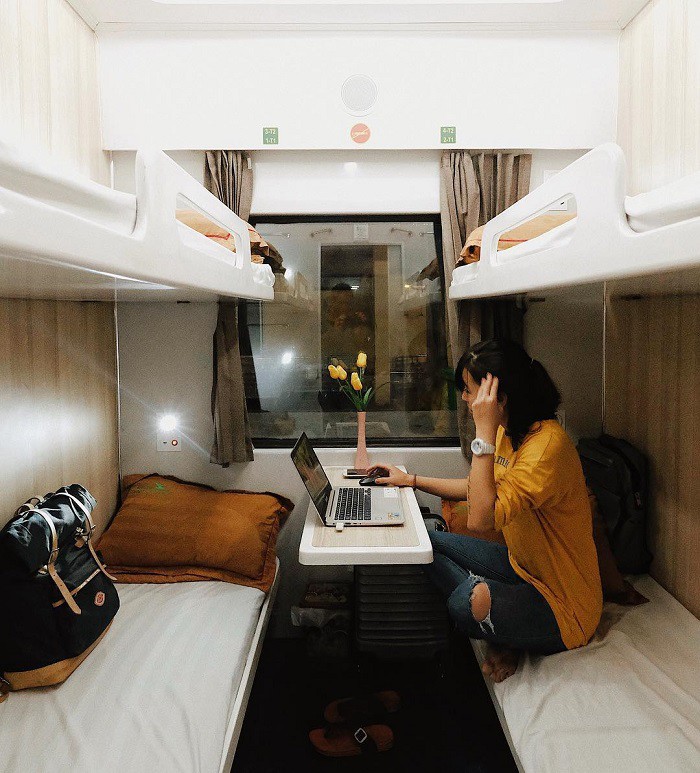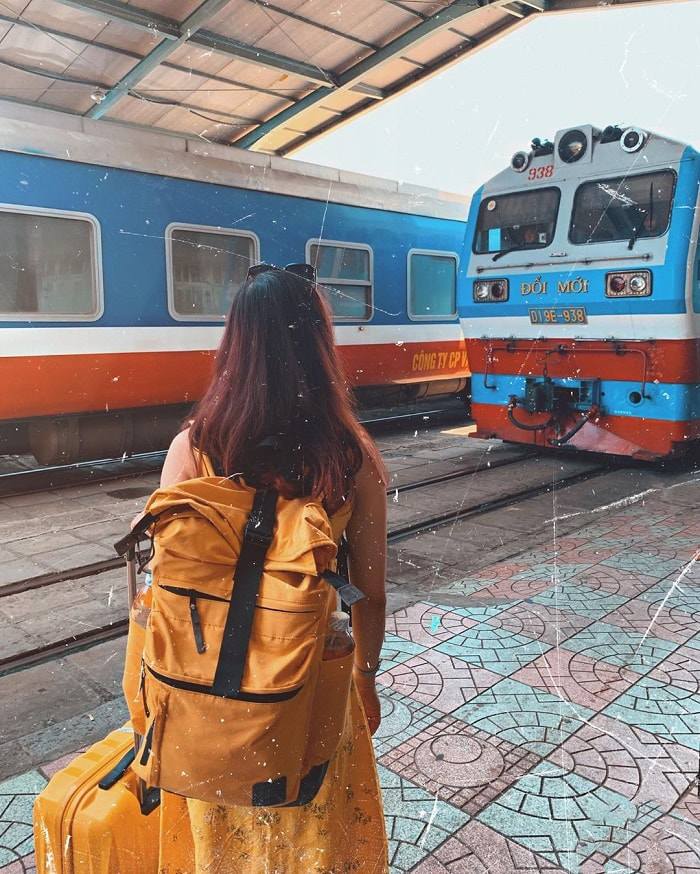Lien Huong (born 1999, Hanoi) and Dang Duy (born 1997, Hanoi) recently embarked on a 7-day train journey from Hanoi to Hue, Danang, and Hoi An. The couple shared that this was their first time traveling by train and the experience was truly fascinating.
Huong said, “We chose the bunk bed tickets in compartment 6 on the second floor, so the total price was around 1.8 million VND per person for a round trip from Hanoi to Hue. From Hue, we continued by train to Danang, a shorter and cheaper route. Traveling by train is quite a ‘chill’ experience. It’s not tiring at all as the procedures are quick and simple. Once you board, you can lie down and relax. The train offers a variety of food and drinks, and our compartment had a table from which we could enjoy the scenery outside the window. The highlight of the trip was definitely the train ride through Hai Van Pass between Hue and Danang, with breathtaking views of the sea and Lang Co. You can’t appreciate these sights when traveling by plane!”

“The bunk beds on the train are equipped with mattresses, bed linen, and thin blankets. Compartment 6 has six beds stacked in three tiers. Each bed also has a reading light and a power outlet to charge phones and laptops during the long journey. The train provides free wifi, but it’s not very strong, so it’s best to have your own 4G connection. The train staff regularly walks through the compartments selling coffee, snacks, and local specialties like boiled eggs, chicken rice, and chicken porridge. Additionally, at each stop, local vendors board the train to sell their region’s delicacies, so you can easily enjoy a variety of tasty treats without even leaving your seat,” Huong added.
Tips for Traveling by Train
Most Scenic Train Routes in Vietnam
When it comes to the most beautiful train routes in Vietnam, travelers often rave about the journey from Danang to Hue, where they can take in the majestic and vast natural scenery of the Hai Van Pass and Lang Co Bay. Another popular route is from Ho Chi Minh City to Nha Trang, offering travelers a glimpse of pristine and idyllic beaches along the way.

For those seeking a romantic and flowery atmosphere, the train route from Dalat to Trai Mat is a perfect choice, offering endless fields of flowers and rows of cherry blossom trees. On the other hand, the Muong Hoa mountain train in Sa Pa presents a more rustic and primitive beauty, with the wildness of the Hoang Lien Son mountain range and the misty hill tribe villages.
Book Tickets in Advance for Great Deals
Regardless of your chosen route, it’s advisable to book your tickets early to take advantage of various promotions and discounts, as well as to secure the best seats. Booking in advance is especially important if you’re traveling in a group, as it ensures that you’ll be seated together. Approximately 1-2 months before your trip, simply visit the website of the Vietnam Railways Corporation, enter your departure and arrival points, along with the date of your journey, and you’ll be able to find the perfect train ticket.
Types of Seats on Trains
Trains in Vietnam offer a range of seating options, including hard seats, air-conditioned hard seats, air-conditioned soft seats, and sleeping berths. Each type of seat comes with a different price tag. For longer journeys, it’s recommended to opt for sleeping berths to ensure a more comfortable and relaxing trip. Soft and hard seats are more suitable for shorter distances.

Hard Seats
These are the most affordable seats on the train, allowing travelers to save a significant amount of money. However, they are made of hard wood and are fixed in place, which can be uncomfortable and tiring during long journeys.
Soft Seats
Soft seats offer a more comfortable experience than hard seats and are considered the standard option for train travel in Vietnam. They feature a swivel mechanism that allows passengers to adjust the backrest up to 15 degrees. Nonetheless, they may still not provide sufficient comfort for extended trips.
Sleeping Berths
A typical train compartment has six sleeping berths arranged in three tiers, with each bed equipped with a thick mattress, pillows, and blankets. Some trains also offer four-berth compartments with two tiers. This is the most comfortable option, especially for long-distance travel, but it comes at a higher price. Consider your preferences and budget when choosing the type of seat that best suits your needs.
Bring Necessary Documents and Personal Items

Don’t forget that trains are a domestic means of transportation, so bring your national ID card, citizen ID, or passport for boarding. To ensure a comfortable journey, pack essential personal items such as toothpaste, toothbrushes, tissues, and wet wipes, especially if you’re traveling on a long-distance train. Wearing comfortable clothing will also enhance your overall experience.
Bring Your Own Food and Drinks
For longer trips, it’s a good idea to bring some packaged food, snacks, and drinks. While trains do offer a variety of food options, it’s better to be prepared if you have a sensitive stomach or particular dietary preferences.
Foreigners Experience Coffee with a Splash of Quirk in Ninh Binh: Ducks Waddle Beneath Their Feet.
The captivating video went viral, showcasing a unique coffee experience in Ninh Binh, Vietnam. It captured the delight of a foreign visitor who enthusiastically embraced the opportunity to enjoy a cup of coffee while wading through ankle-deep floodwaters, surrounded by a joyful troupe of swimming ducks. This unforgettable moment has captivated audiences, offering a glimpse into the enchanting and unexpected experiences that await in Vietnam.





































